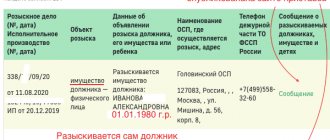For what reasons are court proceedings on alimony suspended?
Before talking about ways to resume enforcement proceedings, it is necessary to find out on what grounds it was terminated and by whom. This information is extremely important for resolving the issue in a positive direction.
According to Art. 39-40 Federal Law “On Enforcement Proceedings”, a limited circle of officials can stop it:
- Bailiff.
- Judge.
The authorized person terminates enforcement proceedings on the basis of challenging a previously made decision, filing a complaint by the alimony payer, or the emergence of significant life circumstances for the citizen.
The bailiff has the right to request the suspension of enforcement proceedings in the following cases:
- The need for clarification of the court decision.
- The payer is on a long business trip.
- Death of the alimony payer.
- Dismissal of the payer.
- The child reaches adulthood.
- The payer's stay in long-term hospital treatment.
- The alimony payer undergoes emergency service or is sent to “hot” spots.
The reasons for suspending judicial proceedings are quite varied. The above list is only a small part of them. They can be used not only by the bailiff, but also by the judge who previously made a decision on the assignment of payments or the need to repay the alimony debt.
After the suspension of court proceedings, the collection of alimony payments ceases. In fact, this is a violation of the rights of a minor to be provided for by his parents. However, it is permitted by law if there are compelling reasons. The recipient of payments may well initiate their renewal, justifying his demands with references to current regulations.
After 18 years of age, child support payments cease, which leads to the suspension of enforcement proceedings. Its renewal is impossible, since after reaching the age of majority a citizen is considered fully capable, i.e. must earn money to live independently. The same applies to the death of the alimony payer. For obvious reasons, he cannot pay money for child support. In this case, they fall on the shoulders of the state represented by the Pension Fund. Until the age of 18, alimony will be replaced by a survivor's pension.
In some cases, enforcement proceedings are resumed automatically, i.e. there is no need for interested parties to contribute to this process. As a rule, this is done after the cessation of the circumstances that caused the suspension of the court decision. For example, the alimony payer was on active duty. After its completion, payments are resumed in full.
Where to apply for the resumption of enforcement proceedings
The resumption of enforcement proceedings on alimony must take into account the authority that initiated its suspension. Thus, the interested party will need to initially contact:
- Court.
- FSSP.
Both the recipient and the payer of payments have the right to contribute to the resumption of enforcement proceedings. In many ways, it depends on the reason for suspending the court decision.
If the suspension of enforcement proceedings occurred by court. The interested party must submit an application to the court in which the decision in this case was made. In the case of bailiffs - to the executive service.
Before filing an application to resume enforcement proceedings, a citizen must ensure the legality of his actions. Let us remind you that in some situations it is extremely difficult to restore payments. Let’s say that the case may be complicated by the loss of the alimony payer’s job or his recognition as incompetent.
What do you need to know about collecting child support?
To receive alimony, the applicant must apply to the court with an application for a court order or with a statement of claim for alimony. The applicant may be a parent living with the child, a guardian or an official acting in the interests of the child.
If there are no issues related to establishing paternity, and the involvement of other interested parties is not required, an application for a court order must be submitted to the court. In other cases, including if alimony will be collected in a fixed amount, you need to immediately write a statement of claim.
An application for a court order for the collection of alimony is transferred to the magistrate's court, where a decision is made on it. The court order is prepared in 5 days and, if the payer really evades paying alimony for minor children and does not raise any objections in response to the order, it is transferred to the bailiffs for execution after 10 days.
Along with the application to the court, you must provide:
- receipt of payment of state duty;
- supporting documents (certificate of income, etc.).
If there are objections from the payer, the claimant will have to draw up a statement of claim to the court, which will be considered more carefully, with the participation of the claimant and the defendant and the evidence provided by them. In this case, the court decision is made within a month and comes into force another month later. It is worth noting that when filing this statement of claim you will not need to pay a state fee.
The plaintiff must have the following documents and photocopies with him:
- passport;
- marriage certificate for married people or divorce certificate for divorced people;
- child's birth certificate;
- document establishing guardianship or trusteeship, if necessary;
- a certificate of family composition at the child’s place of residence;
- certificate of income of the plaintiff and defendant.
You also need to prepare a copy of the statement of claim for the defendant.
If, after a positive court decision, the defendant still does not pay alimony, he can receive compensation in the amount of 0.5% of the debt amount for each day of delay. The claimant writes an application for the collection of a penalty to the court, the amount of the penalty is calculated by the bailiff service.
General provisions
The work of the FSSP is regulated by Federal Law No. 229 of October 2, 2007. This lists the persons who have the right to suspend enforcement proceedings and the grounds for such actions. By law, a court or an FSSP employee has such powers. The process of collecting alimony is stopped when the following circumstances arise:
- death of the payer
- recognition of the debtor as missing
- loss of legal capacity and confirmation of this fact in court
- seizure of the alimony provider's property
- existence of a claim for a reduction in payments or deferment of payment
In the mentioned cases, enforcement proceedings are stopped by law and it is difficult to resume them. But there are situations when an FSSP employee suspends the process in other circumstances:
- hospitalization of the debtor
- wanted notice for recipient or payer
- conscription into the RF Armed Forces for military service
- filing a complaint about the inaction of FSSP bailiffs
Enforcement proceedings can also be stopped by the court under Federal Law No. 229 (Article 39). Reasons for this action:
- sending the payer on a business trip for a long time
- claim for seizure of property subject to foreclosure
- disputes over the legality of the decision of the FSSP employee
- going to court to obtain clarification on enforcement documentation, etc.
According to Federal Law No. 229 (Article 45), if the individual entrepreneur is suspended, the forced collection process is not applied.
How production resumes
To resume the process, you must contact the court and demand that enforcement proceedings on alimony be resumed. The reason may be the termination of the reasons that previously served to make the decision. For example, the debtor was previously on a business trip, but has now returned. The same applies to other situations
It is important for the interested party to inform the FSSP employee about the elimination of the reasons why the proceedings were suspended earlier. It is not profitable for the debtor to do this, because he is trying in every way to avoid responsibility.
Step 1. Preparing an application
At the first stage, the claimant needs to prepare an application for the resumption of enforcement proceedings in free form, indicating the following details:
- name of the FSSP to which the appeal is submitted;
- information about the applicant (full name, tax identification number, residential address, contact information);
- date of application.
The applicant should include the following information in the text of the document:
- the basis for penalties (number and date of the writ of execution);
- circumstances that influenced the suspension of enforcement proceedings;
- date of suspension of collections;
- grounds for resumption of enforcement proceedings.
Step-2. Payment of the performance fee
The resumption of enforcement proceedings requires the initiator to pay an enforcement fee in the amount of 7% of the amount of the claim, but not less than 1,000 rubles.
A payment order to pay the fee can be obtained from the FSSP, after which the applicant must go to the nearest bank branch to transfer funds.
Step-3. Contacting the FSSP
To resume alimony proceedings, the claimant must contact the FSSP body that issued the decision to suspend the collection, having the following documents with him;
- identity card (citizens of the Russian Federation present a passport, foreigners and stateless persons living in the Russian Federation - a residence permit);
- application for the resumption of enforcement proceedings on alimony;
- receipt for payment of the execution fee;
- writ of execution, the proceedings on which are subject to renewal (copy);
- grounds for collecting alimony (child’s birth certificate, divorce certificate, etc.);
- resolution to suspend enforcement proceedings (copy).
In addition to the above papers, the FSSP may require additional documents, which may be significant when considering the case for the restoration of penalties. It is better to check with the FSSP about the list of such documents immediately before applying.
Step-4. Resumption of enforcement proceedings
Upon the applicant’s appeal, the case for the resumption of enforcement proceedings is considered by the FSSP in accordance with the general procedure.
If the claimant applied to the FSSP before the expiration of 3 years from the date of suspension of enforcement proceedings, then, based on the claimant’s application, the FSSP issues a resolution to resume alimony deductions.
Next, the procedure is carried out in the general manner: the FSSP transmits the writ of execution to the employer, who, in turn, makes deductions in accordance with the requirements of the document.
The procedure for resuming completed enforcement proceedings
As soon as the claimant receives a decree to terminate enforcement proceedings, he has the right to file one of the following procedural actions:
- a justified complaint against the bailiff’s decision to terminate enforcement proceedings to a higher authority of the bailiff service or to the court;
- re-sending the writ of execution with an application to initiate enforcement proceedings with justification of the reasons.
After carrying out these actions, the claimant has the opportunity to resume enforcement proceedings and achieve execution of the court decision in full.
Features of the procedure for restoring enforcement proceedings
The law on enforcement actions is quite complex; it contains a lot of vague and general formulations, which make it possible to close many sheets of paper without their final execution. There is a certain procedure for resuming terminated enforcement proceedings.
- First of all, you need to make sure that the obstacles that arose in the way of the bailiff have been removed. Evidence of this fact must be attached to the application. If you already have them, you can request them officially, but submitting an application without such certificates is useless. The text should also indicate the main stages of conducting this case, from the decision to the suspension or termination itself. However, for example, if one of the parties does not agree with the assessment of the property put up for auction, then the disagreeing party can appeal the bailiff’s decision to accept the assessment results directly through the court.
- Where to apply to resume production? Such a document is submitted directly to the bailiff or to the court itself. At the same time, the restoration of enforcement proceedings, if it has already been completed, will mean the continuation of measures to implement the court decision and an extension of deadlines. In fact, this should not be a new case, not a new production, but the same thing that was previously closed.
- If, after the extension of the relevant deadlines for enforcement proceedings, the bailiff does not take any action, then a complaint can be filed against him in court regarding the inaction of the bailiff, or you can choose an internal appeal procedure by contacting the senior bailiff - the head of the department of this bailiff service.
Video with tips on protecting the rights of the claimant, the possibilities of filing a complaint against the bailiff, actions aimed at speedy execution of the court decision by the bailiff:
Reasons for renewal
According to the law, a person has the right to ask for the resumption of the alimony case if the reasons that led to the suspension of the process are eliminated (this has already been mentioned above). The following situations are possible here:
- the debtor recovered and was discharged from the hospital
- the payer returned from the ranks of the RF Armed Forces
- the alimony provider acquired property, etc.
In other words, production is resumed when the reasons for which the decision to suspend was eliminated.
The legal basis for renewal may be:
- writ of execution issued by the court
- judicial order
- alimony agreement drawn up by agreement of the parties
In the latter case, notarization of the document is required.
Procedure for resumption of production
Art. 44 of the law establishes the validity period of the suspension decision. Only the duty of the judge or bailiff is indicated to resume collection when the reasons that prevented execution are eliminated (for example, if the plaintiff refuses the demands). The law does not require a special application to be submitted to the court. Based on Art. 440 of the Code of Civil Procedure of the Russian Federation, the collection will continue after the adoption of the corresponding determination, which will be transferred to the bailiff.
If the withholding of alimony was suspended on the basis of a resolution of the FSSP, then it is also resumed automatically.
There is a problem: the bailiff does not always receive the necessary information. The debtor is often not interested in sending notices of termination of participation in hostilities or termination of medical treatment. For this reason, the claimant needs to fill out an application to resume the suspended alimony process (Part 7, Article 45 of the law).
Renewal instructions
Interested parties often make requests to resume enforcement proceedings for the collection of alimony and restore previous payments. Often requests remain unconsidered due to a violation of the procedure. According to the law, this is possible in the following ways:
- Filing a complaint against the action/inaction of an FSSP employee. This is relevant if production was suspended or closed without legal explanation.
- Filling out and submitting the application to the FSSP employee.
The choice of option depends on the circumstances of the case and the reason why the authorized bodies suspended the proceedings.
What you need
To resume payments of child support, you must fill out an application and prepare a package of documentation. Particular attention is paid to filling out the first document, which is often confused with a claim. To increase the chances of success, there must be evidence on hand confirming the possibility of resuming the alimony case.
What's included in the package
A positive decision is possible by contacting the FSSP with the necessary documents. This package includes:
- Application (we will consider the rules for its preparation below).
- Applicant's passport (copy).
- Performance list.
- A document confirming a temporary or complete stop of production.
Additionally, certificates, extracts and other evidence may be required confirming the possibility of resuming the procedure. Depending on the situation, the package may include:
- certificate of dismissal from the ranks of the RF Armed Forces
- refusal to suspend IP
- documents from the police confirming the successful search for the debtor, etc.
In each case, the package is formed individually, but the main attention is paid to the evidence base.
Step-by-step instruction
In order to resume proceedings on alimony payments, it is important to approach the solution of the problem responsibly. Instructions for action depend on the selected option.
When filing a complaint:
- File a complaint indicating the fact of violation of the law during the decision to suspend or terminate the enforcement process.
- Submit the document to the senior bailiff in person or via the Internet on the FSSP resource.
- Wait for the decision.
- If it doesn't work, contact a higher-ranking officer.
When submitting an application in the event of a change in circumstances:
- Submit a request to resume production.
- Give it to the FSSP employee.
- Wait for the resolution to be sent to the participants in the process.
- Receive a decision on renewal (full, partial) or refusal.
Sometimes it may be necessary to go to court when the decision to suspend was established by this body.
Application rules
When drawing up an application, it is important to indicate all the necessary details. The document includes:
- The name of the body where the document is transferred (FSSP, court).
- Address, full name and contact details of the plaintiff.
- Title of the document.
- Information about the person who issued the writ of execution.
- Reason and date of suspension.
- Applicant's requirement. Here you can indicate, they say, I ask you to resume enforcement proceedings for the collection of alimony.
- Details of the bank or post office for making the transfer.
- List of documents proving the applicant’s position. This includes other documentation, for example, the grounds for stopping or temporarily suspending the case.
- Day of registration and signature.
Where to contact
When choosing a structure for appeal, it is important to focus on the authority that made the decision. There are two options here:
- FSSP department. The application is submitted to the body that made the decision. It is recommended to hand over the document personally to the responsible employee.
- Court. If the decision is made by a judicial authority, it is necessary to contact it. By law, bailiffs cannot cancel a decision of a higher authority.
Collection under a writ of execution
The basis for starting the collection of alimony payments is enforcement proceedings carried out on the basis of a writ of execution. The plaintiff, in order to submit a writ of execution to the FSSP, must submit an application, which must contain information about:
- the applicant's passport or other identification document;
- known information about the defendant (alimony payer) - place of residence, place of residence, contact telephone number, place of work;
- information about the court that issued the writ of execution;
- name of the document providing the basis for issuing the writ of execution;
- amounts of payments established by the court;
- payment details of the plaintiff’s bank account for crediting collected alimony payments;
The bailiff must make a note on the application indicating the date of its acceptance, since within 24 hours from this date enforcement proceedings must be initiated, or a decision must be made to refuse to accept the writ of execution.
Grounds for refusal to accept:
- the application form is not followed, the application is not signed by the person submitting it;
- the statute of limitations for filing a writ of execution has expired;
- enforcement proceedings have already been initiated against this executive order or there are legal grounds for suspending the proceedings;
- the procedure for submitting an application by a representative has not been followed;
The FSSP authorities, after initiating enforcement proceedings, send the writ of execution for execution to the organization where the debtor works. At the place of work of the alimony payer, an order is issued, on the basis of which the required amount of alimony is deducted from his income.
If the alimony payer is listed as unemployed, the bailiff sends requests to banks to obtain information about the payer’s bank accounts, and also makes requests to other government bodies in order to establish information about the debtor’s property.
If the location of the payer and his place of residence are not known, the bailiff sends documents to search for the debtor to law enforcement agencies.
If necessary, the bailiff will schedule a conversation with the debtor. The powers of the bailiff also include the ability to make a decision to restrict the payer’s travel outside the Russian Federation.
How is the issue of resumption of production being considered?
The FSSP employee must consider the applicant’s request and decide on further actions. Based on the results of the study, a resolution with the adopted decision is prepared:
- resumption of the process
- partial recovery of funds.
- refusal to satisfy the request
An important point is to inform the debtor about the resumption of the process. This will take up to five days. The payer receives a copy of the decision and a notice indicating the need to pay the debt voluntarily or involuntarily.
Resumption of enforcement proceedings on alimony
The concept of alimony is inextricably linked with family law. Therefore, general rules regarding the determination of their size, the order of appointment, and collection are established in the Family Code of the Russian Federation.
When the court makes a decision on payments, procedural law comes into play. The Code of Civil Procedure of the Russian Federation establishes a procedure for considering a case and revising the adopted final documents. In addition, Section VII pays attention to the execution of judicial acts.
Finally, in the case of forcible collection of funds from the debtor, the provisions of the Federal Law “On Enforcement Proceedings” (hereinafter, the Law) are additionally applied.
In what cases is re-excitation possible?
Even when the proceedings are completed or suspended, the woman can, if she wishes, begin the procedure for claiming alimony. However, there are some conditions for this.
Thus, the writ of execution or order of the magistrate must again return to the disposal of the claimant. Moreover, the original deadlines for applying to the FSSP still remain in effect.
Several typical situations are discussed below. However, it is worth considering that each case of alimony collection has its own characteristics.
After termination
This is the most difficult situation. Thus, the reasons for termination are reflected in Art. 43 basic laws. These include reversing a court decision to pay alimony or reaching a settlement agreement with the payer. Be that as it may, the executive document remains with the bailiffs.
Therefore, it will no longer be possible to open a new business. However, there is an option that the parties can use by mutual agreement. We are talking about a notarial agreement on the payment of alimony.
Such an agreement in accordance with the provisions of paragraph 2 of Art. 100 of the Family Code also has the power of a writ of execution. And when the terms of the deal are not fulfilled, it can be given to the bailiffs for work.
After graduation
The grounds for this are stated in Art. 47 of the Law. In particular, the procedure ends after the child’s mother herself has withdrawn the writ of execution or court order.
Further, the document can be presented to the bailiffs again within the time limits specified in it. In this case, the entire process of forced collection of alimony actually begins from the very beginning.
The end of the case is also due to the commencement of personal bankruptcy proceedings against the debtor. Then the materials are transferred to the financial manager who oversees the insolvency process.
After suspension
The application is submitted to the authority that accepted the relevant document. When it comes to court, the claimant submits the application there. This follows directly from the content of Art. 438 Code of Civil Procedure of the Russian Federation. The appeal emphasizes that the circumstances for suspending enforcement proceedings no longer exist.
In a situation where enforcement actions are postponed by the bailiff, the application is submitted in his name. All evidence available to the claimant is included as attachments.
Afterwards, you need to periodically ask whether production has resumed. It would also be a good idea to request a copy of the resolution.
There is no executive document
If the writ of execution for alimony is lost , then in this situation the rules provided for in Art. 430 Code of Civil Procedure of the Russian Federation. The article states that a duplicate document is issued both on the basis of an application from the claimant and the bailiff.
It is allowed to go to court during the entire period of time that the previous executive document is in force - up to 18 years. Situations involving its loss by the bailiff himself are no exception. Then the claimant has the right to submit an application within a month from the moment the relevant information became available to him.
10 days are allotted for consideration of the application. As part of the process itself, both the circumstances of the loss of the document and the evidence provided by interested parties are examined.
What is alimony, grounds for assignment and termination
Child support refers to monthly payments aimed at providing financial support for a minor child. Divorce of parents and the child living with one of them is considered a legal basis for attracting the other parent to participate in the life of the little person from the side of financial support.
According to Article 106 of the RF IC, there are two ways to assign and process payments:
- An agreement drawn up by parents in a peaceful manner, which is subject to mandatory notarization. In the document, the spouses indicate the amount of payments, the frequency of payment, and whether the payment will be made in cash or non-cash.
- If the parents cannot agree, then the party with whom the child lives has the right to file an application with the court with a request to assign alimony and determine its amount.
ATTENTION !!!!!! The amount of payments is determined by the court in accordance with the financial security of the payer. When an alimony worker is officially employed, a copy of the writ of execution is sent to the administration at the place of work, according to which the accounting department withholds the necessary amounts from the employee’s salary and transfers them no later than 3 days after the payment of wages to the recipient of payments (Article 109 of the RF IC).
It often happens that alimony is not paid regularly. Then the claimant also has the right to seek protection in court.
If there was a refusal to collect alimony, is it possible to restore
The recipient of alimony, for example, the mother of a young child, has the right to refuse it. This can be done if an agreement has been concluded between the parties or special proceedings are underway. Refusal of alimony even means cases when the plaintiff holds the writ of execution without handing it over to the bailiffs.
Revocation of the executive document
The claimant of payments for his maintenance or for a child has the right to revoke the writ of execution.
This procedure is carried out by the bailiff service. The procedure is as follows:
- First, you need to visit the bailiff leading the case and clarify the possibility of terminating the proceedings.
- Next, you need to draw up a specific statement on the basis of which this document will be recalled. A sample can be collected on site.
- Get the document.
The withdrawal of the writ of execution only suspends payments, since the obligation to pay alimony remains. And the payer’s debt will only grow.
The claimant has the right to initiate the renewal of payment before the child reaches adulthood, as well as within 3 years after that.
How to reopen a child support case
We can talk about the renewal of alimony in two cases:
- when the claimant personally refused to receive it;
- when the payer fails to fulfill his obligations.
If alimony was ordered by the court, then to resume payments you must contact the bailiff service.
How to reinstate alimony withholding
Withholding of alimony payments is carried out on the basis of an application from the employee or a writ of execution. In both cases, the employer begins to withhold a certain percentage from the employee’s salary. For one child, no more than 25% can be withheld, for two – 33%, and for three or more – 50% (up to 70% is withheld in exceptional cases).
In the case where payment was ordered through the court, and then the claimant withdrew the provided paper, he can resume withholding alimony. To do this, you need to contact the bailiffs and fill out the appropriate application. Then production will be restored, and the payer’s employer will receive the necessary documents to withhold funds.
Is it necessary to go to court?
Revocation of a writ of execution by the recipient or any other method of terminating alimony payments does not mean that the court decision loses force.
Therefore, there is no need to go to court again. The claimant may file a claim only in the following cases:
- Changing the amount of alimony. For example, the plaintiff wants not only to resume payments, but also to receive more due to a change in the payer’s income.
- Collection of alimony is carried out not only in favor of the child, but also in favor of the mother (pregnant, disabled, etc.).
- Change your payment method. The plaintiff can initiate the collection of funds not as a percentage of income, but as a fixed amount.
- Termination of payments. The payer will be officially released from his obligation to pay alimony.
If one of these problems needs to be resolved, the plaintiff should immediately go to court. A new decision will be made, and the new sheet will be immediately transferred to the bailiff service.
Application for resumption of enforcement proceedings on alimony
Enforcement proceedings for the collection of alimony are carried out on the basis of Federal Law No. 229. According to this regulatory act (Article 44), all documents on enforcement proceedings for the collection of alimony payments are stored in the bailiff service.
It is impossible to resume production if it was terminated legally. For example, if the recipient of the money died, reached the age of majority, etc. If the payment was suspended by the recipient, he can resume collecting the funds. To do this, an application is made to the bailiff service.
Application to the Bailiff Service
The resumption of enforcement proceedings is carried out with the help of an application. You can take a sample from the bailiff in charge of this production, or find it on the Internet. There is no standardized document form, so you can draw up an application in free form.
- name of the organization to which it is submitted;
- information about the parties - the collector and the payer;
- description of the circumstances of the case: when the court decision was made to collect alimony, the reasons for the suspension of enforcement proceedings, etc.;
- requirement to resume the procedure for collecting payments;
- details of the bank card or account where the funds should be transferred;
- date and signature.
If the court decision or writ of execution is in the applicant’s hands, it should be attached to the application. After all checks, production will resume, and the money will be transferred to the guardian (parent).
Submission of writ of execution
According to Art. 21 Federal Law No. 229, these documents have a certain validity period. This total period does not exceed 3 years from the date the court made the relevant decision. But there is an exception regarding writs of execution for the collection of periodic payments.
First of all, these are alimony payments, which are provided by the payer on a monthly basis. In these cases, the paper is valid throughout the entire payment period. That is, until the recipient reaches adulthood. There is also a statute of limitations, which when collecting alimony is three years.
You can provide the document even after the person reaches the age of majority. According to the law, the child himself can do this if he wants to collect a debt from a parent. But if he turns 21, the writ of execution loses its legal force.
Is it possible to suspend alimony payments?
According to family law, parents are required to pay child support for the maintenance of a child with whom they do not live.
You can carry out the procedure for transferring funds voluntarily, but most often payment occurs on the basis of a court decision. And the end of enforcement proceedings for alimony should be carried out only for legitimate reasons. The assignment of alimony payments is of a declarative nature. Therefore, in order for enforcement proceedings to be opened, the recipient is obliged to go to court. Only on the basis of such a claim is an appropriate decision made. The transfer of funds for a disabled relative is forced.
And this procedure is suspended or terminated completely for a variety of reasons. Enforcement proceedings are terminated in accordance with several regulations. These are Federal Law No. 229, Plenum of the Supreme Court No. 50 and the Family Code of the Russian Federation (Article 120). Payments may be terminated for the following reasons:
- the child's coming of age;
- a young child has received full legal capacity (married, etc.);
- baby adoption;
- the child support payer disputes his parental rights;
- the recipient is recognized as able to work;
- the spouse who was the recipient of the mat. assistance, registered a new marriage;
- death of the payer or a person who was in his care.
Important! The end of production can be resumed, unlike the termination of payments.
The suspension of alimony is initiated not only by the payer, but also by the court or bailiff. This often happens when a court decision to collect funds to pay alimony is challenged. The court can also suspend the procedure on the basis of a corresponding request from the bailiff. The reasons are as follows:
- death of the payer;
- serious deterioration in health;
- stay of a person on a business trip;
- searching for a person for non-payment.
Providing mat. assistance is suspended indefinitely. To resume the transfer of alimony, the reason for the delay is eliminated. Many alimony payers believe that lack of work is the reason for exemption from this obligation. And then the claimant will receive nothing.
But the law provides for attempts to avoid the obligation to support disabled relatives. Therefore, even an unemployed payer is obliged to provide appropriate financial assistance. But in a fixed fixed amount. And any debt is collected from his property.
It is at this stage that payments are suspended. To collect alimony, the seized property must be appraised and then the property must be sold to repay the debt to the recipient. And he has the right to file a claim for the accrual of penalties for the amount of debt.
Any party has the right to appeal the actions of the bailiff or other procedural measures. To do this, the debtor must draw up an application indicating:
- position, full name of the person whose actions violate the applicant’s rights;
- personal information;
- facts confirming the illegality of the offender’s actions;
- applicant's requirements;
- signature;
- date of.
It is considered by the court at the plaintiff’s place of residence.
Termination of enforcement proceedings for alimony ordered by the court is possible under the following circumstances:
- death of a participant;
- the age of the recipient;
- obtaining legal capacity by a person;
- challenge by a citizen of paternity.
Suspension of payments for these reasons is final.
If a corresponding agreement has been drawn up between the parents of a minor child (or between the payer and the legally capable recipient), then the termination of the mat. assistance occurs for the following reasons:
- expiration of the agreement;
- termination of an agreement;
- according to the terms of the contract.
General reasons for termination of payments also have legal force.
The alimony obligee does not have the right to stop payments without warning the relevant authorities. Therefore, before you suddenly stop enforcement proceedings for alimony, you should write a statement.
There are two ways to pay child support:
- voluntary. Typically, both parties enter into an agreement and have it certified by a notary office. In the document, they stipulate their conditions for making/receiving payments, the schedule for depositing funds, and payment methods. Oral agreements do not carry any legal weight, therefore they have no relation to official agreements;
- forced recovery through court. This method is resorted to much more often, since most broken couples cannot find a compromise on the size of payments and the schedule for making them. It is easier to resolve these controversial issues with the involvement of a third independent party, which is the court. After the court ruling and its entry into force in case of refusal to pay, the defaulter will be officially considered a violator, who will be dealt with by the bailiffs.
The agreement can be terminated and the court’s decision can be challenged by filing an official request (petition) explaining the reasons that must become compelling circumstances for changing it.
If one of the spouses, after an official divorce, was obliged by a court decision to pay alimony, and one fine day decided to stop making financial contributions, the payer must have a good reason for this.
We suggest you read: How to prove paternity outside of marriage and file for alimony in court
It is important to distinguish between the termination or suspension of alimony payments by a court decision and at one’s own request, which in this case is equivalent to a violation of the law and will invariably entail punishment. In this case, it is completely irrelevant whether the reasons for committing such actions were compelling.
Even if the court decides in favor of the alimony-obliged person, he will be required to pay the debt that accumulated after the violation of the schedule in the period of time between the willful termination of contributions and the court’s decision.
If the recipient and the person obligated for alimony have agreed to pay alimony through an agreement, then this document relieves obligations on both sides in the following cases:
- if any condition mentioned in the contract as a circumstance for its termination has been met;
- if one of the parties has died. In this case, the parties mean the payer and the recipient (child, parent). For example, if the mother actually received money for a common child from the father obligated to support him, but she died, then this will not be a reason to terminate the agreement, since the official recipient (child) is alive. However, if he moves to his father and completely transfers to his maintenance, then the agreement is canceled, which is usually indicated as one of the clauses-conditions for termination of the document;
- if the contract has expired. In this case, you can renew the agreement or agree on new terms if there is still a need to pay alimony. For example, former spouses entered into an agreement under which the father agreed to pay for his son’s college education. After successfully completing secondary specialized education, the child decided to enter a university. Although the previous agreement had expired, the parents entered into another one under new conditions (large amount of payments) and for a new term (my son’s graduation from university).
Expert opinion
Maria Lokshina
Family law expert since 2010
In rare cases, a reason for completely canceling alimony may be
challenging paternity
. If it turns out that the child is not the biological son/daughter of the person obligated to support him, then he is not obliged to provide financial support.
Dear readers! Our articles talk about typical ways to resolve legal issues, but each case is unique. If you want to find out how to solve your particular problem, please use the online consultant form on the right or call:
7; 8
It's fast and free!
Who suspends alimony proceedings and when?
Enforcement proceedings for alimony are initiated on the basis of an application from the claimant and any of the following executive documents on the collection of alimony:
- court order>;
- writ of execution issued on the basis of the decision;
- a notarized agreement on the payment of alimony.
In this case, the document may concern both the withholding of funds from the parent for the child and for another family member.
According to the law on enforcement proceedings, an already initiated case for the collection of funds can be suspended either by the bailiff himself on his own initiative or at the request of the collector, or by the court at the request of the collector, debtor or bailiff.
The court suspends enforcement proceedings if:
- The debtor filed a claim to remove the seizure from the property or to exclude it from the inventory in cases where it was planned to foreclose on this property.
- Challenging the results of property valuation.
- Challenging by the alimony debtor the bailiff's decision to withhold the enforcement fee, as well as challenging in court the writ of execution, the basis of the judicial act or the actions of the bailiff.
- Appeals from any party to the proceedings (bailiff, collector, debtor) with a request for clarification of a decision or other judicial act, as well as an executive document.
Bailiffs suspend alimony proceedings in cases where:
- The debtor has lost his legal capacity.
- The alimony payer is participating in hostilities.
- The debtor filed for bankruptcy.
- The alimony payer requires an installment plan or deferment of execution.
- The payer has been put on the wanted list, as well as his property or the child in whose favor alimony must be withheld.
After these circumstances have disappeared or lost their significance, an application is submitted to the court or bailiff to resume enforcement proceedings on alimony.
When can the bailiff finish enforcement proceedings?
The bailiff formalizes the termination of enforcement proceedings by issuing a termination order, in which the bailiff indicates the grounds for termination with reference to the law. The grounds for termination may be the following:
- Actual execution of the court decision in full;
- Impossibility of collection due to the lack of property from the debtor in an amount sufficient to fulfill the obligation;
- Death or bankruptcy of an individual debtor
- Liquidation or bankruptcy of a legal entity
Obstacles to the execution of a court decision must be justified by materials of enforcement proceedings, such as, for example, an act on the impossibility of collecting the amount of debt from the debtor, the absence of a positive result in the search for the property of the debtor or child. Moreover, even if these facts are proven, this does not mean that the situation is hopeless.
How the claim is reviewed
The rules for considering an application for renewal of alimony are provided for in Art. 64.1 of the law. The appeal can be sent to the territorial department of the FSSP at the place of residence of the paying parent. The document must be transferred to the official involved in the collection of funds within 3 days from the date of receipt by the FSSP.
The bailiff is given 10 days to consider the application and make a decision based on its results. This document is sent to the claimant no later than the next day after acceptance by mail to the residential address indicated by the applicant.
Legal consequences of filing an application
Having considered the application, the bailiff may make a decision on:
- resumption of collection;
- partial renewal of deductions from the parent’s income;
- refusal to satisfy the claimant's demands.
Any of the documents can be appealed by both the recipient of funds and the debtor, since bailiffs often commit violations. After receiving a refusal from them, it is recommended to contact a higher division of the FSSP. The document will be reviewed within 10 days from the date of receipt. If the results of the consideration of the complaint do not satisfy the claimant, then there is no need to refuse further actions. The claimant has the right to file an administrative claim with the district court.
What to do if the writ of execution is lost
Court decisions to collect alimony are carried out by bailiffs on the basis of special papers. These are so-called writs of execution, which contain the necessary information about the payer, the amount of alimony payments and other information. This paper may be initially sent to the bailiffs or provided to the plaintiff.
And the plaintiff, for his part, may lose it. And the question immediately arises: is it possible to collect alimony if the document is lost? According to Art. 12 Federal Law No. 229, the loss of the original document does not affect the right of the claimant to receive alimony. The court may issue a duplicate document.
To re-receive the paper, you must contact the court that issued it. If you file an application in another court, it will be returned to the person.
In this case, the application must be completed correctly, indicating the following points:
- Information about the recipient of alimony and the payer.
- Details of the document with the help of which the obligation to pay was established.
- Information about the bailiff who is entrusted with the relevant enforcement proceedings.
- Description of the circumstances under which the writ of execution was lost.
- Please provide a duplicate of the document.
- Date and signature.
The person responsible for the loss of the document must prove the fact of the loss. As evidence, you can use the relevant certificate from the bailiff service. Without such a document, it is impossible to restore the writ of execution.
The application can be drawn up immediately when applying to the court to obtain a duplicate, and a sample can be obtained from the court secretary. If during the trial a lawyer was involved in the case on behalf of the plaintiff, he can help with the re-issuance of the writ of execution.
The issuance of a duplicate is subject to a state duty (Article 333.19 of the Tax Code of the Russian Federation). Its size is no more than 40 rubles. After submitting the application, it is checked, and then a decision is made to re-issue the document or to refuse. The court can refuse if the deadlines are not met.
It is possible to restore a lost writ of execution or any other document issued by the court only during the time it is valid. If we are talking about a document on the basis of which payment of alimony must be made, then its validity period lasts until the child reaches adulthood and another three years after that.
Throughout this period, the claimant has the right to go to court and obtain a duplicate. And with a duplicate, you can contact the bailiffs to resume proceedings to collect alimony. They will also forward documents to the payer's employer, compile a list of the person's assets that can be used to collect the debt, etc.
The court can easily establish the amount of child support and force the defendant to fulfill his obligations towards the child. But even bailiffs cannot always control this process or be responsible for the relationship between the recipient and the payer. Therefore, recipients often themselves suspend the collection procedure, knowing that they can resume it if necessary.
Deadlines for submitting a writ of execution
The writ of execution itself does not have a statute of limitations, but the law still has a deadline for its presentation..
The Law on Enforcement Proceedings of the Russian Federation establishes a rule according to which the limitation period is established for the presentation of a writ of execution to the FSSP for the collection of alimony. According to the current rule, this period is 3 years.
There is an exception to the general rules for presenting a writ of execution for execution. This exception applies to those writs of execution that contain clauses on the frequency of payments. In this case, the document can be presented to the FSSP:
- on any day during which alimony is awarded (for example, on any day, but before the child reaches adulthood);
- upon expiration of periodic payments, a period of 3 years is also established (for example, after the child has already reached the age of majority, a writ of execution can be presented for execution within 3 years from the date of the child’s majority);
If the suspension is illegal or the bailiff refuses to renew it
It often happens that due to the heavy workload, FSSP employees illegally suspend the collection of alimony. One of the reasons is the impossibility of locating the debtor and his property.
Alas, in most cases this is a reluctance to work and actively interact with law enforcement agencies in terms of searching for the payer. If the bailiff illegally suspended the proceedings or refused to resume it, you will need a complaint against the bailiff, which will force him to take all possible measures to find the payer.










